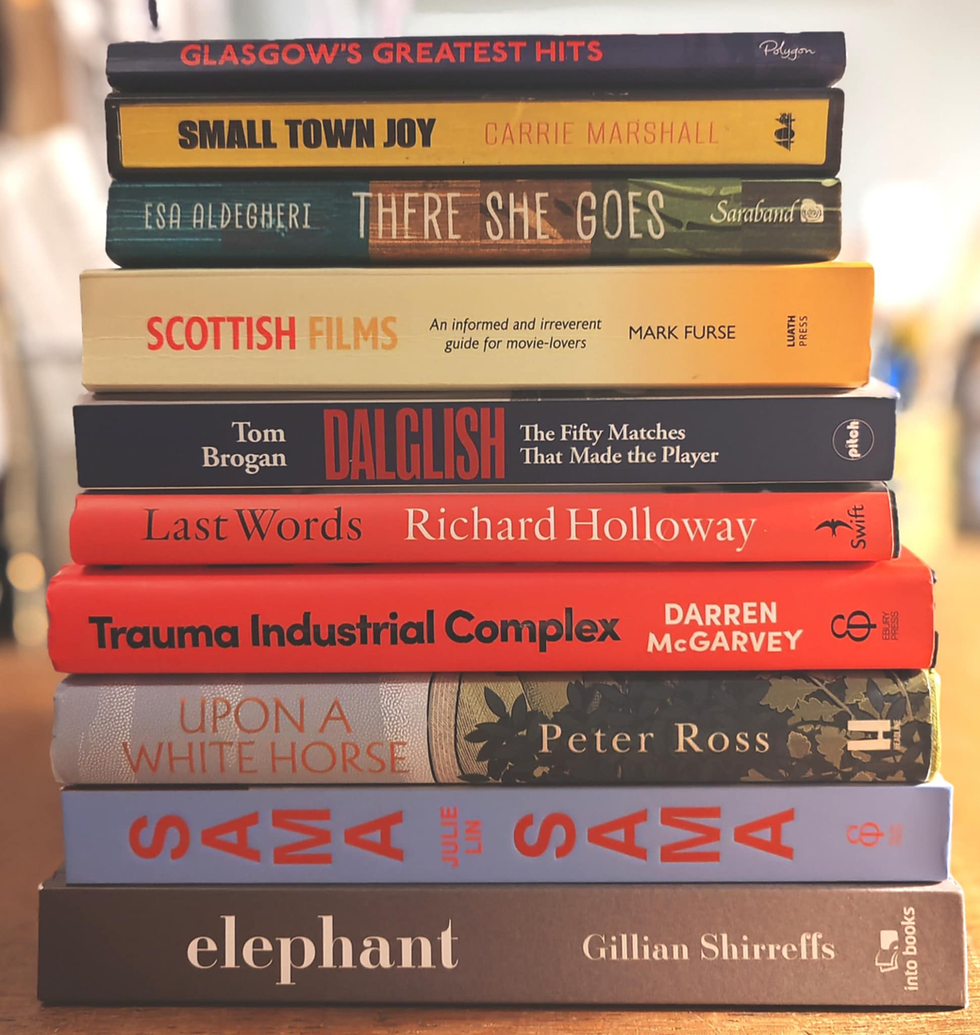Stinking Thinking: A Review Of Martin Geraghty’s A Mind Polluted…
- Alistair Braidwood

- Apr 18, 2018
- 3 min read
Updated: Dec 2, 2021

There are often claims that ambition and risk are increasingly resisted and discouraged in contemporary fiction – sure things are what booksellers are after leading to books being published which are easy to market and sell. While I’m sure there is evidence to back this up, I would suggest Scottish writing has rarely been as healthy in terms of different voices and visions, and this is cause for celebration.
In the last couple of years, on these pages, we have reviewed novels as diverse and challenging as David Keenan’s This Is Memorial Device, M.J. Nicholls’ The House Of Writers, Olga Wojtas’ Miss Blaine’s Prefect and the Golden Samovar, Polly Clark’s Larchfield, Helen McClory’s Flesh Of The Peach, Ever Dundas’ Goblin, Charlie Laidlaw’s The Things We Learn When We’re Dead, Kenneth Steven’s 2020, David F. Ross’ The Man Who Loved Islands, Kevin MacNeil’s The Brilliant & Forever, and many more. All of them are distinctive and diverse, and add fresh and invigorating perspectives to the Scottish cultural conversation. Or, to put it another way, and in the words of Chic – “These are the good times”.
Martin Geraghty’s debut novel, A Mind Polluted, deserves its place among those named above. A fascinating and brave attempt to understand what makes people commit the worst of crimes, Geraghty was motivated to write it by the tragic and brutal murder of Labour MP Jo Cox in June, 2016. On his website he explains:
“Various aspects of the tragedy resonated with me. The actual murder of a beautiful person who attempted to make the world a better place, the tremendous dignity her husband showed, then, I began to think about the individual who carried out the murder. What happened in his childhood? What happened in his life to get to this stage? When the answers to these questions became public, I began to write…”.
What he began to write is the story of Connor Boyd, a young man whose life is changed forever by an overheard conversation. This occurs in the ‘Prologue’, and Connor’s attitude and behaviour change overnight, so much so that his family, teachers and friends don’t recognise him as the boy they have come to know. As Connor’s stance hardens he tries to alienate his family, particularly his mother who, as the cover of the book suggests (above), is the source of his discontent – at least that is how he sees it.
You may think, as you read, that you know where this story is going, but Geraghty wrong foots the reader throughout. Split into three parts, the story spans Connor’s early life, from those troubled teenage years, through finding real friendship, purpose, and the possibility of redemption in part two, before everything unravels.
Perhaps surprisingly, as the more obvious action occurs elsewhere, it is the middle section, where Connor’s life threatens to have a happy ending, which is where Geraghty’s writing really shines. While not having the dramatic action of his childhood years, or the gripping and breathless final chapters, it is where real life is reflected most recognisably with Geraghty showing he has a keen-eye for detail and how people interact. James Kelman’s often quoted (often on these pages) statement that ‘real drama is to be found in ordinary people’s everyday lives’ came to mind as Connor finds work, camaraderie, love, and the possibility of happiness before his world comes crashing down in the most terrible manner.
How childhood events can affect individuals in later life is something which has been examined many times in literature – Lionel Shriver’s We Need To Talk About Kevin and Jonathan Trigell’s Boy A are two recent examples which spring to mind, and like those Geraghty is constantly asking the reader to throw away their prejudices and to constantly ask questions to which he never gives easy answers.
The reader’s sympathies and empathy are constantly in flux as Connor’s relationships wax and wane and his thoughts and actions shift. Ideas of responsibility, morality, free-will, blame, guilt, nature and nurture, and culpability are all explored, and I can imagine that every reader will finish the book with a different opinion on what they have just read, which will, in turn, say as much about them as it does the text.
A Mind Polluted introduces an exciting and inquisitive new voice in Scottish writing. It’s clear Geraghty wants to explore the human condition through his writing, something, I would suggest, fiction does better than any other art form. With his debut, Martin Geraghty is asking questions which many may not wish to consider, and that itself makes A Mind Polluted worthy of attention. If you like your literature challenging, ambitious and risky, then this is a novel you must read.
A Mind Polluted is out now, published by Crooked Cat Books.









Comments